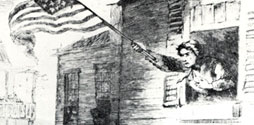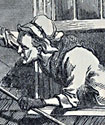
Barbara Frietchie

As a Quaker during wartime, Whittier struggled to write patriotic poetry that wasn’t warlike, he heard a story that inspired such a poem. It was the story of Barbara Frietchie. As in many of his “historical” poems, Whittier used poetic license. When it became controversial, he wrote an introduction:
“This poem was written in strict conformity to the account of the incident as I had it from respectable and trustworthy sources. It has since been the subject of a good deal of conflicting testimony, and the story was probably incorrect in some of the details. It is admitted by all that Barbara Frietchie was no myth, but a worthy and highly esteemed gentlewoman, intensely loyal and a hater of the Slavery Rebellion, holding her Union flag sacred and keeping it with her Bible; that when the Confederates halted before her house, and entered her dooryard, she denounced them in vigorous language, shook her cane in their faces, and drove them out; and when General Burnside’s troops followed close upon Jackson’s she waved her flag and cheered them. It is stated that May Quantrell, a brave and loyal lady in another part of the city, did wave her flag in sight of the Confederates. It is possible that there has been a blending of the two incidents.”
 The incident took place in Frederick, Maryland, when the Confederate troops marched in. That morning there had been 40 Union flags flying, but by noon, when the Confederate troops entered, they had all disappeared.
The incident took place in Frederick, Maryland, when the Confederate troops marched in. That morning there had been 40 Union flags flying, but by noon, when the Confederate troops entered, they had all disappeared.
Up rose old Barbara Frietchie then,
Bowed with her fourscore years and ten;Bravest of all in Frederick town,
She took up the flag the men hauled down;In her attic window the staff she set,
To show that one heart was loyal yet.Up the street came the rebel tread,
Stonewall Jackson riding ahead.Under his slouched hat left and right
He glanced; the old flag met his sight.He orders his men to fire on it, and
Quick, as it fell, from the broken staff
Dame Barbara snatched the silken scarf.
She leans out the window and says the words that school children were to remember for generations:
“Shoot if you must, this old gray head,
But spare your country’s flag,” she said.
And the reaction of Stonewall Jackson is just as memorable:
The nobler nature within him stirred
To life at that woman’s deed and word:
“Who touches a hair of yon gray head
Dies like a dog! March on!” He said.All day long that free flag tost
Over the heads of the rebel host.
Barbara represented one of Whittier’s favorite themes: the effectiveness of non-violent action.
Full text of "Barbara Frietchie"
